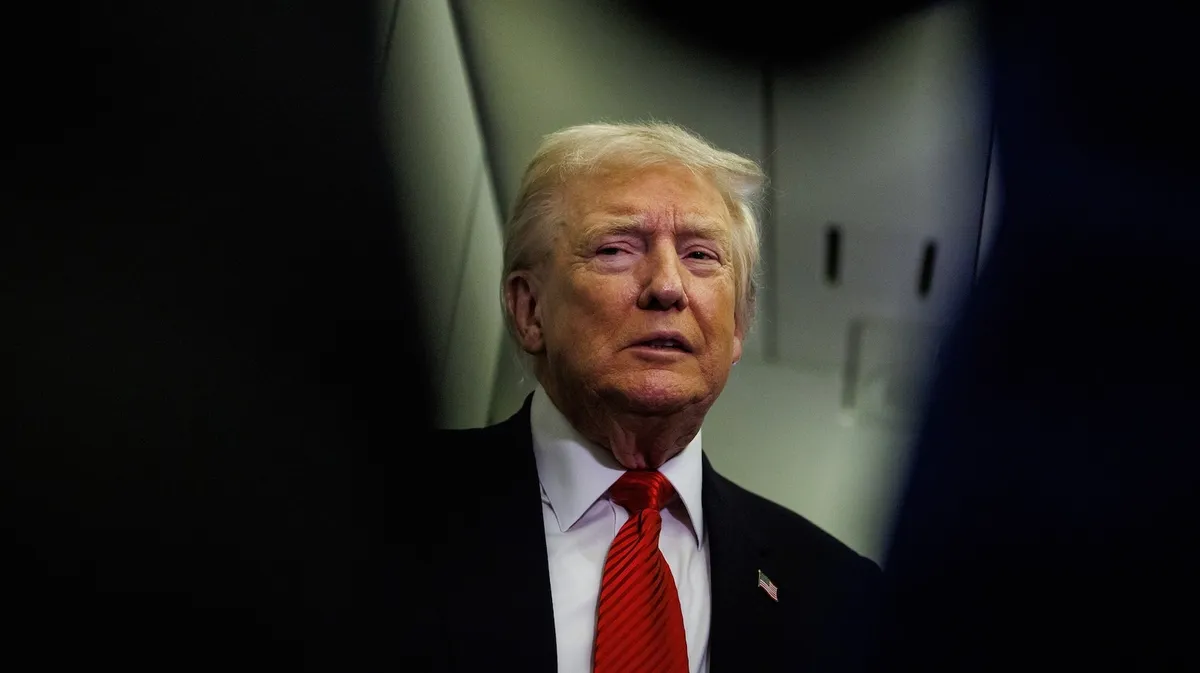
In April, former President Donald Trump solidified his long-held stance on tariffs as the official policy of the United States by imposing extensive levies on nearly all global trade partners. On Wednesday, the Supreme Court will deliberate whether these tariffs are lawful and should remain in effect. Trump has stated that this case is the most significant one in the court's history, highlighting his personal investment in the matter.
In a demonstration of his commitment to the issue, Trump had considered attending the court proceedings himself, which would have made him the first sitting U.S. president to observe such arguments. However, he changed his mind on Sunday, expressing that he did not want to divert attention from the case. “No, I don't think so, because I don't want to call a lot of attention to me. It's not about me, it's about our country,” he remarked. On Air Force One, returning from a weekend in Florida, Trump emphasized the gravity of the Supreme Court's decision for the nation's future.
Trump has consistently asserted that the outcome of this case is vital, claiming that without the ability to impose tariffs, the United States would regress to a "third world nation." During an interview with CBS's 60 Minutes, he reiterated his belief that tariffs are essential for maintaining the country’s economic standing. “Everybody uses tariffs on us. If I wasn't allowed to use tariffs on them, we would be a third-rate nation,” he stated, reflecting his long-standing grievances regarding international trade.
When Trump announced his tariffs on April 2, he labeled it “Liberation Day” for the U.S., framing the move as retribution for perceived injustices he has felt since his early days as a Manhattan real estate developer. “I've been talking about it for 40 years because I saw what was happening 40 years ago,” he explained. Trump declared trade deficits a national emergency and imposed a baseline 10% tariff on nearly every country, along with heightened rates for those he identified as the worst offenders.
Since the implementation of these tariffs, the Trump administration claims to have generated billions of dollars in revenue and has highlighted agreements with the United Kingdom, European Union, Japan, South Korea, and most recently China. However, the rollout of tariffs has also led to economic uncertainty, raising concerns about price increases for American businesses and consumers. A recent estimate from the Yale Budget Lab suggested that tariffs could cost U.S. households approximately $1,700 annually. Furthermore, a new poll from ABC News/Washington Post/Ipsos revealed that over 60% of Americans disapprove of Trump's handling of tariffs and the economy overall.
Trump articulated on 60 Minutes that he believes the U.S. economy would deteriorate if the Supreme Court were to strike down his tariffs, which he has positioned as central to his entire economic strategy. Beyond trade negotiations, Trump has utilized tariffs as leverage in various foreign policy issues. He has claimed that the threat of tariffs facilitated the resolution of international conflicts between countries such as Cambodia and Thailand, and India and Pakistan.
Trump's administration has employed tariffs as a tool to pressure nations like Mexico and China into taking stronger actions against the flow of illicit drugs, including fentanyl. He even imposed a 50% tariff on Brazil following the country's prosecution of former President Jair Bolsonaro, indicating his willingness to wield tariffs for political leverage. Relying on the 1977 International Emergency Economic Powers Act, Trump bypassed Congress in implementing these tariffs, citing the need for swift action. During his interview, he lamented that congressional approval would take too long, asserting, “You need [executive power] to protect our country. This is national security; tariffs are national security.”
As the Supreme Court prepares to review the legality of Trump's tariffs, the implications of their ruling are poised to resonate throughout the fabric of American trade policy and economic strategy. Trump has characterized this moment as one of the most significant decisions in the history of the Supreme Court, emphasizing the stakes involved for the United States and its position in global trade.